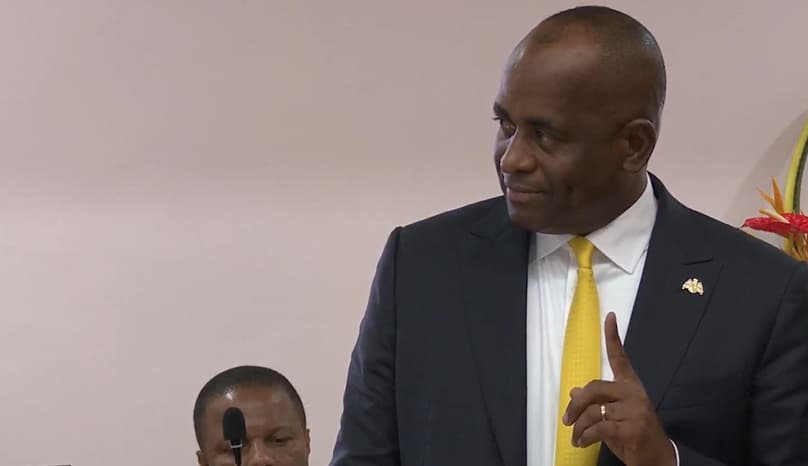PM Skerrit backs 2025–2026 Budget, highlights years of Dominica’s economic growth amid challenges
Prime Minister Skerrit endorsed the Financial Budget, stating it would create jobs and uplift Dominicans, calling it “a budget that provides hope for our young people.”

Dominica: Prime Minister Roosevelt Skerrit addressed the Parliament at the parliamentary debate of Dominica’s 2025-2026 Financial Budget on Thursday while lauding Finance Minister Irving McIntyre for crafting a comprehensive budget that will drive Dominica's economic growth through strategic policies, programs, and projects.
Prime Minister Skerrit expressed his approval of the Financial Budget that he believes will lead to creation of jobs and improve the lives of Dominica's citizens by saying, “The budget provides hope for our young people.”
In his address, the Prime Minister emphasized, “This is a government that listens to the people of Dominica,” noting that the budget's ideas stem not just from policymakers, but from extensive consultations and public engagement, allowing the government to respond to citizens' needs, ambitions, and concerns.
The theme of the budget as given by the Finance Minister is “Balancing resilient development and fiscal discipline for sustainable growth.”
<iframe src="https://www.facebook.com/plugins/video.php?height=314&href=https%3A%2F%2Fwww.facebook.com%2FSupportRooseveltSkerrit%2Fvideos%2F1118632076821335%2F&show_text=false&width=560&t=0" width="100%" height="314" style="border:none;overflow:hidden" scrolling="no" frameborder="0" allowfullscreen="true" allow="autoplay; clipboard-write; encrypted-media; picture-in-picture; web-share" allowFullScreen="true"></iframe>
PM Skerrit further emphasized that in order to achieve the desired growth for Dominica, they have to be fiscally prudent and responsible. He further highlighted that they have been incrementally reducing the tax burdens on the Dominican people.
In a detailed retrospective, Prime Minister Skerrit reviewed Dominica's 45-year economic trajectory from 1980 to 2025, countering claims that there was no growth under the Dominica Labour Party's leadership.
The Prime Minister noted that he had taken the liberty to review the growth rates over the last 45 years and would love to present the statistics to the country.
PM Skerrit Highlights Growth Statistics from World Bank
The Dominica leader began by highlighting the devastating wreck of Hurricane David in 1978, which was accompanied with political instability in the country, noting that that year the country had an economic decline of 18.4%.
He proceeded to outline the economic performances under different administrations saying that, during the first two years of the Dominican Freedom Party (DFP), in 1980 Dominica’s economy grew by 14.4% and in 1981 by 10.8%.
Over the next 8 years of DFP from 1982 to 1989 the economic growth rate averaged 4.2%, and in the last 5 years of the DFP the economy grew by an average of 2.2% while in its final year the government saw 0% growth.
He then highlighted the United Workers' Party's (UWP) 5-year tenure from 1995 to 2000, noting an average annual growth rate of 2.6%, with peak years recording 3.6% growth in 1996 and 3.8% in 1998, absent any natural disasters.
PM Skerrit went on to emphasise that the Dominica’s Labour Party growth from 2000 till the present, noting that the party's early years were marked by austerity, stabilization, and structural adjustment programs. He added that the economy struggled during the first three years, averaging a growth rate of just 0.3% as it underwent institutional adjustment.
Then over the next 6 years, growth climbed to the average of 4.6% per year with notable years including 2007 which saw a 5.4% growth and 2008 averaging a 7.1% in spite of earthquakes and several other issues throughout the years, he added.
The Prime Minister cited major global and environmental disruptions, including the financial crisis that happened worldwide and lasted from 2009 to 2015. He noted that in 2015 Tropical Storm Erika flooded away the assets of the country valued at 96% of GDP, and 2 years later Hurricane Maria in 2017, damaged an estimate of 226% of the country’s GDP.
But despite these setbacks the Prime Minister highlighted that Dominica continued to grow. The country struggled to find its feet in 2018 but saw the growth rate of 5.5% in 2019.
He further highlighted that the government has been a party of growth "We've always had growth in the economy except in the times of great adversity , shocks we have no control over.”
Then came COVID-19 that set the country back severely with 15.7% decline in 2020, with Dominica's revenue dropping by 48% and expenditure increasing because the government had to put all the money into the health sector to buy test kits, supplies to pay nurses, give people free meals every single day, free accommodation every single day.
“So the money was not coming in but the bills were coming out, the country had one of the most comprehensive systems to treat the COVID-19,as the government did not allow any stone to remain unturned to save the people's lives and their livelihood,” outlined PM Roosevelt Skerrit.
Since 2020, the country has rebounded, averaging 6% annual growth from 2021 to 2024 as it navigated the lingering effects of COVID until 2023. This continued growth according to the PM is a result of his administration’s ongoing efforts to bring significant changes in the country and for its people.
Author Profile
Monika Walker is a senior journalist specializing in regional and international politics, offering in-depth analysis on governance, diplomacy, and key global developments. With a degree in International Journalism, she is dedicated to amplifying underrepresented voices through factual reporting. She also covers world news across every genre, providing readers with balanced and timely insights that connect the Caribbean to global conversations.
Latest
- Dominica: Massive fire in Roseau damages businesses, forces...
-
Tragedy at Sea: Belize businessman Edwin Flowers dies after... -
Saint Lucia set to welcome 16 cruise ships and 28,875 visito... -
Jamaica U-20 Reggae Boyz secure 8-0 victory over St. Kitts a... -
St Philip’s North shows strong support for Baltimore during...









